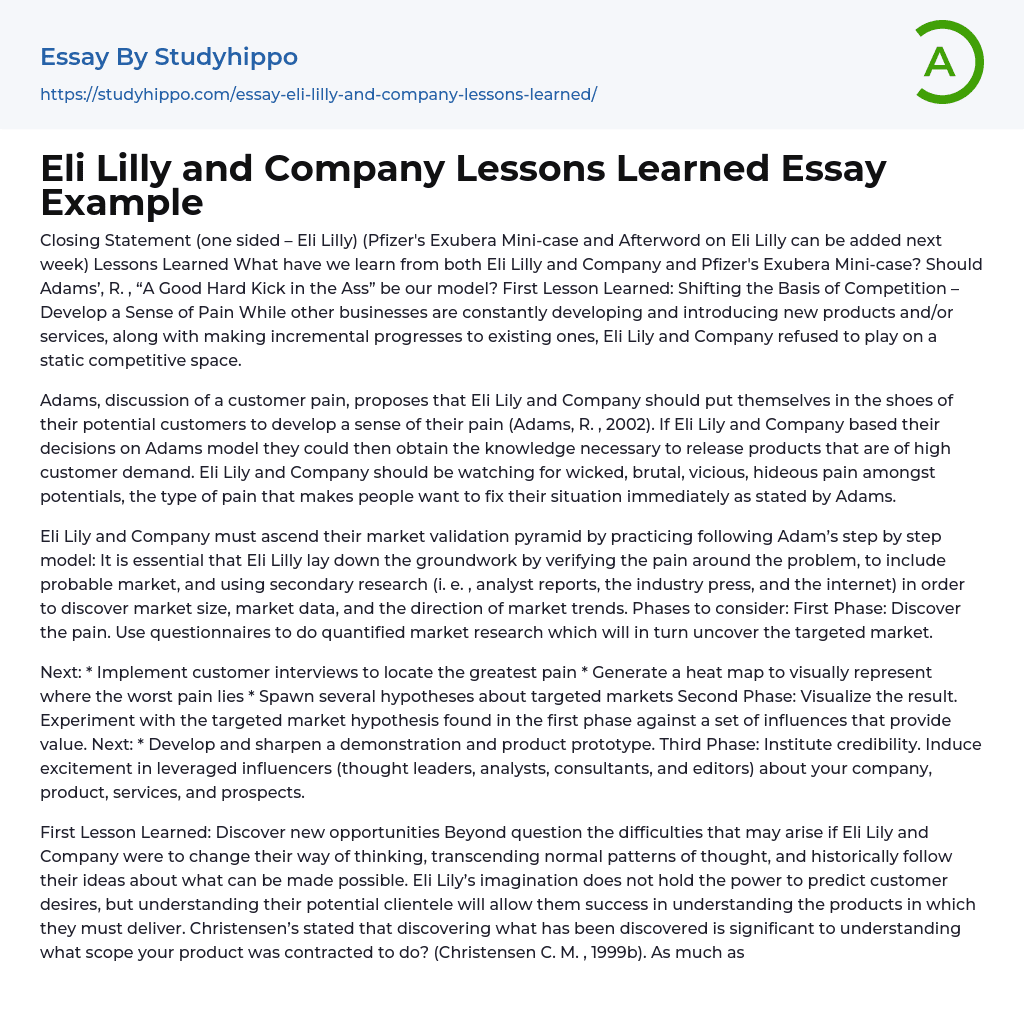Closing Statement (one sided – Eli Lilly) (Pfizer's Exubera Mini-case and Afterword on Eli Lilly can be added next week) Lessons Learned What have we learn from both Eli Lilly and Company and Pfizer's Exubera Mini-case? Should Adams’, R. , “A Good Hard Kick in the Ass” be our model? First Lesson Learned: Shifting the Basis of Competition – Develop a Sense of Pain While other businesses are constantly developing and introducing new products and/or services, along with making incremental progresses to existing ones, Eli Lily and Company refused to play on a static competitive space.
Adams, discussion of a customer pain, proposes that Eli Lily and Company should put themselves in the shoes of their potential customers to develop a sense of their pain (Adams, R. , 2002). If Eli Lily and Company based t
...heir decisions on Adams model they could then obtain the knowledge necessary to release products that are of high customer demand. Eli Lily and Company should be watching for wicked, brutal, vicious, hideous pain amongst potentials, the type of pain that makes people want to fix their situation immediately as stated by Adams.
Eli Lily and Company must ascend their market validation pyramid by practicing following Adam’s step by step model: It is essential that Eli Lilly lay down the groundwork by verifying the pain around the problem, to include probable market, and using secondary research (i. e. , analyst reports, the industry press, and the internet) in order to discover market size, market data, and the direction of market trends. Phases to consider: First Phase: Discover the pain. Use questionnaires to do quantified market research
which will in turn uncover the targeted market.
Next: * Implement customer interviews to locate the greatest pain * Generate a heat map to visually represent where the worst pain lies * Spawn several hypotheses about targeted markets Second Phase: Visualize the result. Experiment with the targeted market hypothesis found in the first phase against a set of influences that provide value. Next: * Develop and sharpen a demonstration and product prototype. Third Phase: Institute credibility. Induce excitement in leveraged influencers (thought leaders, analysts, consultants, and editors) about your company, product, services, and prospects.
First Lesson Learned: Discover new opportunities Beyond question the difficulties that may arise if Eli Lily and Company were to change their way of thinking, transcending normal patterns of thought, and historically follow their ideas about what can be made possible. Eli Lily’s imagination does not hold the power to predict customer desires, but understanding their potential clientele will allow them success in understanding the products in which they must deliver. Christensen’s stated that discovering what has been discovered is significant to understanding what scope your product was contracted to do? (Christensen C. M. , 1999b). As much as Eli Lily and Company should know about what their customers are demanding to be successful. To be successful, Eli Lily and Company must follow these stages: First Stage: Test and observe actual customers performing the use of their product. During the test they should observe what the customer values and feels the product should consist of, starting with the most important aspects and how they should be prioritize. Second Stage: Determine the rewards of substitute products that customers could have
picked.
This will be a benefit in identifying who their competitors are and it will also allow Eli Lilly to open up altered social and emotional dimensions of the customer experience. Third Stage: After completing the identification of product requirements, ELI Lilly should back track to the lower left-hand corner of the Exploration Space Matrix for solutions and improvements that need to be founded on what is conceivable (Christensen C. M. , 1999b). Last Lesson Learned: Validate the Markets Eli Lily and Company has only one chance for success. Losing their edge is the first step in losing control of the market.
Eli Lilly and company must develop a process that is effective in identifying ongoing strategies models for assessing how customers and their requirements affect the market throughout the lifecycle of the product. Eli Lilly and Company must never stop concentrating on the customer and their needs (Adams R, 2002). Reference Adams R. (2002). A Good Hard Kick in the Ass: Basic Training for Entrepreneurs New York: Random House/Crown Business. Christensen C. M. (1996) Eli Lilly and Company: Innovation in Diabetes Care Harvard Business School Publishing, Boston, MA. Referenced on 05/19/2013. Christensen C.
M. (1999) Innovation and the General Manager Boston, MA: McGraw-Hill Irwin. Module 2 – Finding New Markets for New and Disruptive Technologies. (pp. 95-102). Referenced on 05/19/2013. Christensen C. M. (2004). HBS 9-696-077. Eli Lilly and Company: Innovation in Diabetes Care. Harvard Business School. Referenced on 05/19/2013. Romano, A. (2010), Eli Lilly and Company: Innovation in Diabetes Care. Retrieved on 05/19/2013 from http://www. anthonyromano. com/media/61821faed1a1e04bffff953effffe41e. pdf. Unger, B. (2013). Blackboard, Lecture 3, MET AD 741, Boston University. Referenced
on 05/19/2103.
- Bankruptcy essays
- Earnings essays
- Tata Group essays
- S corporation essays
- Secretary essays
- Premise essays
- Adidas essays
- Amazon essays
- Apple essays
- Bmw essays
- British Airways essays
- Burger King essays
- Coca-Cola essays
- Company essays
- Costco essays
- Dell essays
- Ebay essays
- Enron essays
- Facebook essays
- Ford Motor Company essays
- Gap essays
- General Motors essays
- Google essays
- Honda essays
- Ibm essays
- Ikea essays
- Intel essays
- Iphone essays
- Johnson and Johnson essays
- Kellogg essays
- Key essays
- Kfc essays
- Mcdonald's essays
- Microsoft essays
- Myspace essays
- Nestle essays
- Netflix essays
- Nike essays
- Nokia essays
- Pepsi essays
- Pepsico essays
- Red Bull essays
- Ryanair essays
- Samsung essays
- Sony essays
- Southwest Airlines essays
- Starbucks essays
- Supermarket essays
- Tesco essays
- Toyota essays




